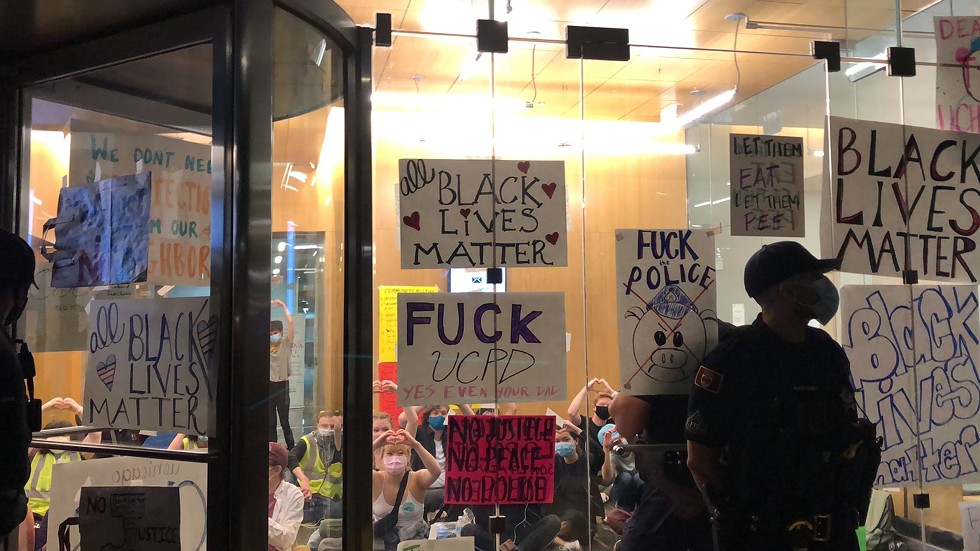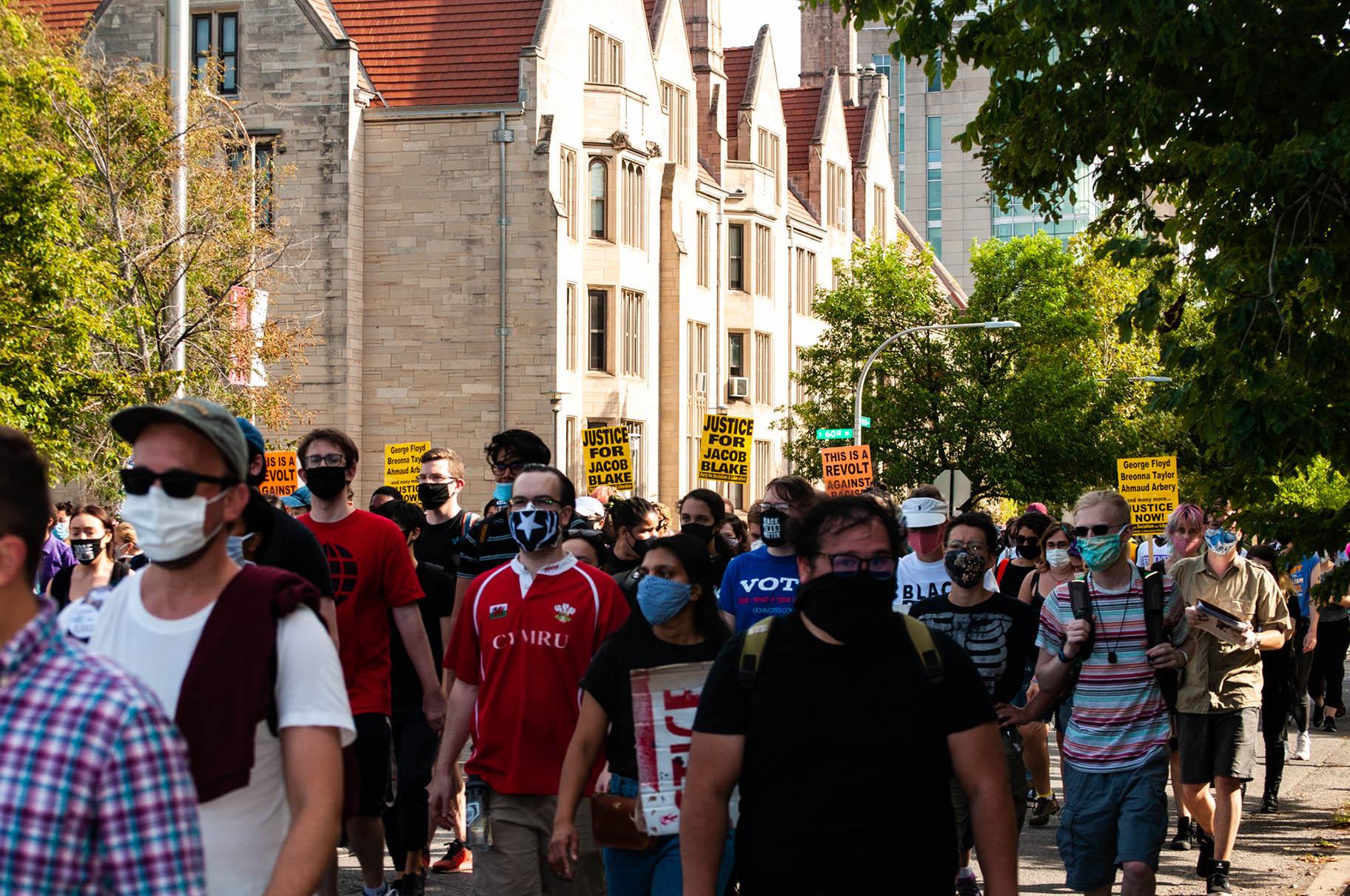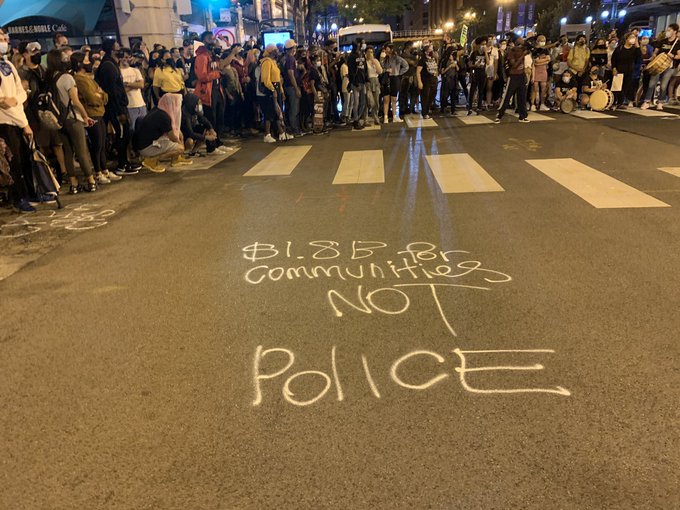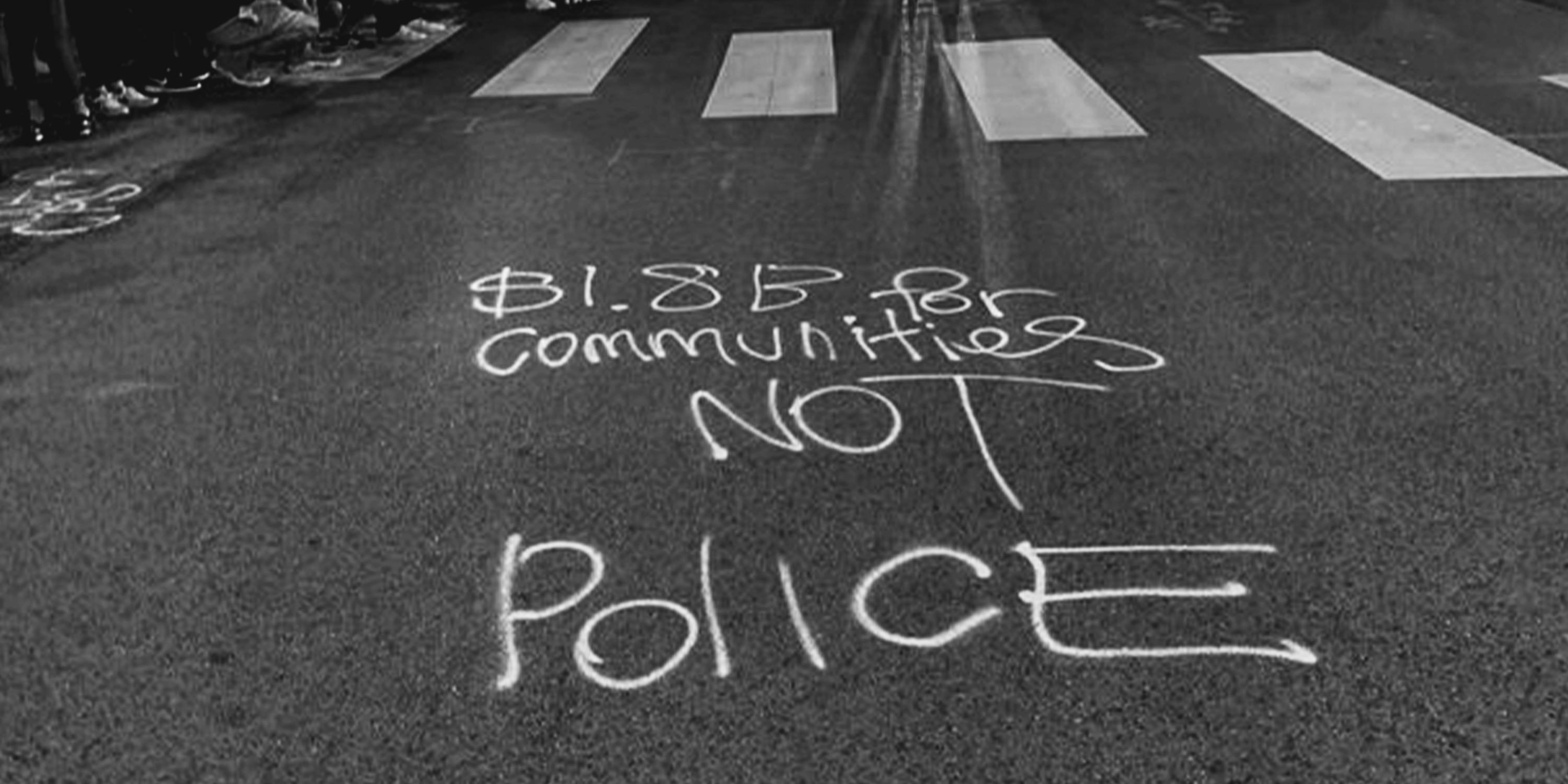Editor’s note: Two sources in this story have been given anonymity to protect their safety.
Among many things, this has been a summer of protests, but not just any protests: protests created and led by young Black and Brown organizers. From the streets to the classroom, youth organizers have refused to go overlooked. Inspired by the Defund CPD and #CopsoutCPS movements, protests at Chicago’s universities fell into step with the primary goals of the campaigns: divesting from police and investing in communities.
Although the demands of protestors at different universities vary, they largely center each individual university’s current relationship status with police.
This summer, and the efforts that come after it, are not new actions of these students, but rather, a familiar pattern to which they have returned.
Chicago college students have a history of activism. Some students are fighting new battles, while others are preparing the same list of demands of those that came before them years prior. But whether it be the same fight, or a different one, student activists reinforced a precedent of relentless protests this summer that’s likely to continue into fall.
DePaul University, June 10

Grace Del Vecchio, 14 East
Less than two weeks after the start of the protests that were sparked by the killing of George Floyd by Minneapolis police, DePaul students took to the streets of Lincoln Park.
The demands of DePaul’s student activists were, and remain, interwoven with multiple movements. Demands include the implementation of the Ban the Box campaign, solidarity with DePaul’s Chartwells workers who have gone without pay since March, the support of the Boycott, Divestment, Sanctions (BDS) movement and elimination of ICE on campus.
Their demands in relation to CPD specifically included the demand for DePaul to discontinue its degree program with Chicago’s Fraternal Order of Police. This agreement gives FOP members a 25 percent discount on tuition, as well as a 75 percent tuition reimbursement from the City of Chicago Police Department. If members receive an “A” they are eligible for up to a 100 percent reimbursement on courses.
DePaul’s relationship with the FOP has been a topic as employees at DePaul Writing Center staged an online walk-out in response to the university’s partnership with the FOP.
Multiple student organizations at DePaul are at the helm of the push to divest from CPD, primarily through the organization DePaul’s Left Alliance, which is a coalition of leftist and politically left-leaning student groups.
DePaul University did not respond to a request for comment by the deadline for publication of this article.
University of Chicago, June 12 and August 29

Grace Del Vecchio, 14 East
June 12 to June 13
Just two days after DePaul’s first in-person protest, student activists at the University of Chicago staged a 19-hour occupation of the University of Chicago Police Department headquarters in Hyde Park.
The action, organized by the student organization Care not Cops in conjunction with UChicago United, Students Working Against Prisons and UChicago Student Action, began as a march beginning at the main quadrangle.
Unlike DePaul, which does not have its own police force, UCPD remains Chicago’s largest private police force, which polices both the UChicago campus, which stretches from 37th Street to 64th Street and from Lake Shore Drive to Cottage Grove Avenue, and the surrounding South Side communities.
The group of 40 protesters, who spent the night inside the headquarters, were barred from using the bathroom by UCPD officers and therefore resorted to peeing in children’s diapers (which organizers outside had to toss past the officers who stood in the doorway) inside of a tent.
The officers inside the headquarters made it difficult for the protesters to sleep, loudly reading the same statement, that the protesters were trespassing and needed to leave the building, every 30 minutes.
After a sleepless night, protesters emerged at 10:30 a.m. to join the other protesters who had spent the night on the street.
Although they were retreating after 19 hours, student organizers made it very clear that they would be back.
August 29 to September 4

Grace Del Vecchio, 14 East
The protesters stayed true to their promise. On August 29, protesters gathered once more on UChicago’s campus, where they marched to Provost Ka Yee Lee’s home on the 4900 block of South Greenwood Avenue in Kenwood.
Student activists with Care Not Cops and UChicago United occupied the space outside of Lee’s home every day and night until September 4. They wrapped up the action with a march on the final day, which culminated outside of UCPD headquarters.
Although this made for the second occupation within a two-month span, this summer was not the first time UChicago students resorted to occupation.
Their first occupation took place in June 2018 on UChicago’s main quadrangle two months after UCPD police shot and injured then-senior Charles “Soji” Thomas, who had been suffering from a mental health episode. As a result of that occupation, the administration agreed to meet with the organizers. However, despite achieving a meeting with the administration, none of the activists’ demands were met.
“It’s actually ridiculous,” said Tai Davidson Bajandas, a rising fourth-year who helped start Care Not Cops in 2018 to the Chicago Reader. “Because one of the things that they have told us, the administration, and something that the police chief told us, was to organize if we want to see change.”
In a statement from the university in August, spokesperson Gerald McSwiggan stated:
“As President Zimmer and Provost Lee noted in the August 12 message, ‘The UCPD provides a vital service in helping to keep safe and support our campus and surrounding communities – a mission that the University has undertaken with the encouragement of community leaders and in accordance with Chicago City Ordinance. That role will continue. We believe it is essential to continue examining our public safety function and ways in which community services provided by the University, including security and policing, can be improved. Our aim is to incorporate critical perspectives about our public safety function, including the UCPD, and to work constructively with critics as well as those who have asked for more engagement from the department.’”
Solidarity Street, August 1

Grace Del Vecchio, 14 East
Although student activists at each university do have a set of demands tailored to fit their respective school, these activists recognized the power of citywide solidarity.
Only July 17, just hours before young protesters were brutalized by police in Grant Park, where protesters attempted to remove the Columbus Statue following the #DecolonizeZhigaagoong rally, an organization named Solidarity Street launched.
The coalition features Chicago universities including UChicago, DePaul, Northwestern University, Roosevelt University, Columbia College Chicago, University of Illinois at Chicago and Loyola University, as well as some organizers from University of Illinois Urbana-Champaign.
After the violent events of July 17 transpired, Solidarity Street released their first official statement.
“Solidarity Street condemns this behavior. We condemn the CPD and Lori Lightfoot’s performative responses to calls for justice,” read the statement. “It is clear that she and the CPD’s allegiance lies with property over our lives.”
The mayor did not offer a direct response to the claims.
Weeks later on August 1, the coalition held its first rally. Beginning in Millennium Park right next to the Bean, hundreds of protesters gathered. After a lineup of speakers and performers, they marched through the Loop, culminating on DePaul’s own downtown campus.
They spent the next two hours listening to more speakers and performers, creating art and dancing.
More scenes from the party going down at Jackson/State. #ChicagoProtests #SolidarityStreet pic.twitter.com/BsGPVccSk8
— Grace Del Vecchio (she/her) (@delvecchiograce) August 2, 2020
Loyola University, August 22
As UChicago students began to occupy Greenwood Avenue, on the other side of the city, student activists at Loyola University were being arrested on their Rogers Park campus.
The university, which does not have its own police force but instead hosts CPD on their campus, has yet to express any support for the Black Lives Matter movement. Fed up by the lack of fervor to support Black students and by the “hostile” environment already perpetuated by white staff members, sophomore Dorien Perry-Tillman felt compelled to take action.
It began with a conversation with his friends. After getting a sense of who would show up for the protest, he made a flyer and posted it across social media.
After a successful first day of protests on August 22, the group of student activists formed Our Streets LUC, creating a full list of demands for the university.
The protests lasted a week, ending with the arrest of seven protesters. Perry-Tillman said he was beaten and arrested by cops. He was charged with failing to abide by Chicago code of ordinance 9-60-120, which is for “pedestrians to exercise due care.”
The arrest, he said, felt like a set-up.
A few days prior, when the students were writing chalk messages on the ground, a CPD officer approached Perry-Tillman.
“Just so you know, the next time you go in the street, we’re going to arrest you,” the officer told Perry-Tillman. “And we want to arrest you first because we have video footage of you being the leader of all this, and you’re gonna take the fall for everyone.”
This intimidated Perry-Tillman, but it did not deter him. Even after his arrest, he felt motivated to continue the work. While the students may not be holding protests every day, they’re putting posters up all over the campus and planning future actions, and refuse to go unnoticed.
“Our school is just not, they’re not responding to us. They’re not reacting to anything. They’re pretty much thinking that they can just wait us out, which is why we just have to keep doing stuff, whether it’s big or small,” said Perry-Tillman.
He too, further echoed the need for solidarity between schools.
“At the end of the day, we’re all in the same fight. Whether we’re fighting our own institution or fighting specific police brutality or fighting for justice. At the end of the day, all we really want is for Black people and minorities to be treated better, everywhere,” he said. “Obviously, we’re all stronger together.”
Loyola University did not respond to 14 East’s request for comment by the deadline for publication of this article.
“At the end of the day, we’re all in the same fight. Whether we’re fighting our own institution or fighting specific police brutality or fighting for justice. At the end of the day, all we really want is for Black people and minorities to be treated better, everywhere,” he said. “Obviously, we’re all stronger together.”
Northwestern University
Northwestern carries its own history of student activism. From the 1968 Bursar’s Takeover to staging a hunger strike in 1995 to demand that the university create an Asian American studies program, the university is no stranger to student protests.
Although the occupation of the Bursar’s office — where students with Northwestern’s Black Student Alliance, For Members Only, occupied the Bursar’s office for 38 hours to protest the negative treatment of Black students at Northwestern — took place over 50 years ago, the demands of Black students today are similar to those of the 1960s.
Student activists at Northwestern continue to honor the Bursar’s Takeover in their fight to make Northwestern a safe space for Black students.
“We always honor the Bursar’s Takeover by presenting the demands that were never met in the list of 50 that they gave them, which I would say is a majority of the demands,” said Z, a student organizer with Community Not Cops.
On Northwestern’s website, there is a whole section devoted to commemorating the Bursar’s Takeover. It’s complete with research and archives, and yet the lessons from the original 38-hour takeover seem to have been missed.
The list of demands between the protests of the 1960s and 2020 bear a stark resemblance: They call for the university to divest from policing and, in turn, invest in their students.
Northwestern, like UChicago, has its own private police force which also duly polices the campus and the surrounding communities on both the Evanston and Loop campuses. Also like UChicago, the budget for NUPD is not publicly available due to the private nature of the police force.
Both NUPD and Evanston police will call on each other. Z said that she’s even seen NUPD cars in her neighborhood in Rogers Park, over the border in Chicago.
“We’re trying to take a deeper dive into how they function to figure it out for ourselves so we know how to make more specific demands and it’s been hard to do so because they’re really shady about everything,” said Z.
For Members Only has always been focused on organizing through community building. Now, Z said, they’ve further emphasized this role by mobilizing around disbanding Northwestern’s private police force and making the university a better place for Black students.
Northwestern University did not respond to 14 East’s request for comment by the deadline for publication of this article.
Roosevelt University, September 26
This year’s The American Dream Reconsidered Conference, hosted by Roosevelt University, featured Mayor Lori Lightfoot as the keynote speaker, to some students’ dismay.
To one student, Amayi T., considering the current climate and complicated relationship the mayor has with CPD and, in turn, the residents of Chicago, this invite felt like a slap in the face. So Amayi decided to stage a protest on Roosevelt’s Loop campus on September 16.
‼️PLZ BOOST‼️
Black Native students at Roosevelt need your support! If you’re a marshal & can volunteer dm us, if you’re a certified Legal Observer dm us, & if you’re neither, we still need you to show up & tell Lori Liefoot she’s gonna be a 1 term mayor
See you tomorrow at 12 pic.twitter.com/6Eoaltu6gA
— Solidarity Street (@SolidarityStCHI) September 16, 2020
While Roosevelt’s administration claimed to support the students’ protests, they requested that students not do just that. They asked via email to Amayi, “would the student like to express themselves peacefully with questions/concerns to Mayor Lightfoot?”
Although Roosevelt does not have a private police force, it has a security department which regularly welcomes CPD onto the downtown campus. And while Roosevelt again claims to support its Black and Indigenous students, Amayi, who is Afro-Indigenous, has felt anything but support from the university.
Last fall, while experiencing a mental health crisis, Amayi was beaten and brutalized by police outside of their home when the police arrived at their home on the South Side for a wellness check. Upon returning to campus, they were told that CPD would be present to give out domestic violence resources. This caused additional trauma.
“To see a flyer talking about how CPD is going to be on campus handing out domestic violence resources … excuse me,” they said. “Being the person I am, I started a petition.”
Amayi collected 60 signatures and brought the petition to the university’s Multicultural Student Support Services. No changes were made.
To Amayi, Roosevelt’s actions are performative, stating that the university didn’’t communicate with the students about police brutality as urgently as they did with COVID-19.
“If you cared about protesters so much, if you were so for the cause, you would have sent a freaking email [alongside] the Coronavirus email talking about the horrific things that happened on July 17,” said Amayi, who was among the young protesters who were brutalized on July 17. “And I was there at the Columbus statue. I was pepper sprayed.
“What side are you really on? What side are you on? Because you are not on the freedom side.”
In a response from Roosevelt, the university’s spokesperson, Katy Cesarotti, stated, “Roosevelt University is one of the most active universities supporting social justice and equity, including the Black Lives Matter movement, since the foundation of the University and ongoing through our mission.”

Grace Del Vecchio, 14 East
Whether in the streets or in (virtual) classrooms, one thing about university activism in Chicago is certain: solidarity between students is necessary.
“Solidarity across colleges: I think we need it 100 percent. Universities love to target student organizers and I think it’ll be harder to justify targeting us if we’re all doing the same thing across universities at the same time,” said Z.
Student protesters at universities across the city, in varying locations with varying endowments, seek the same end goals: divestment from policing and investment in Black students.
This fight isn’t new. It’s arduous and exhausting, tracing back to activists through generations, but it is nonetheless constant. Maybe, just maybe, this reinvigorated effort will be the push this generation needs to win its battles.
Header image by Grace Del Vecchio




NO COMMENT